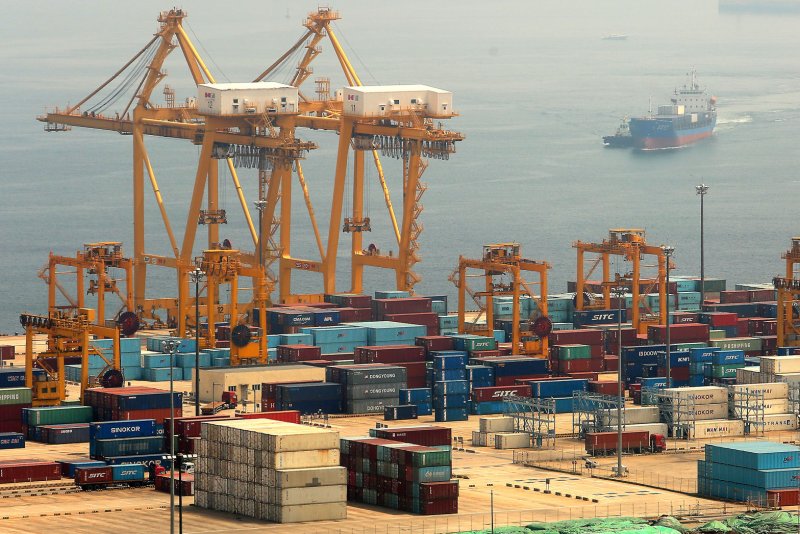A commercial container ship heads to a row of dockside gantry cranes in Dalian, China, on July 20, 2018. File Photo by Stephen Shaver/UPI |
License Photo
March 26 (UPI) -- U.S. tariffs on China are having a tremendous impact on Americans' income -- to the tune of more than $1 billion every month, the Federal Reserve of New York and researchers said in a new fiscal analysis.
The price of goods and products saw "substantial increases" because imports include a "complete passthrough" of tariffs imposed by the Trump administration, according to research from the New York Fed, Princeton University and Columbia University. The research also said domestic products had less competition from imports, which raised prices.
By the end of November, U.S. income was reduced by a rate of $1.4 billion per month, the study said. The economists -- Mary Amiti of the New York Fed, Princeton professor Stephen Redding and Columbia professor David Weinstein -- said a lack of import variety and supply disruptions were significant factors.
"Economists have long argued that there are real income losses from import protection. Using the evidence to date from the 2018 trade war, we find empirical support for these arguments," the researchers wrote in the study, which used data from November. "Losses mounted steadily over the year, as each wave of tariffs affected additional countries and products, and increased substantially after the imposition of the wave 6 tariffs on $200 billion dollars of Chinese exports."
The study found total losses from January through November last year ballooned to almost $7 billion.
The Trump administration imposed $200 billion in tariffs on Chinese goods last year in a long-running trade dispute, to which China answered with its own tax penalties. This week, U.S. Treasury Secretary Steven Mnuchin will travel to Beijing to continue talks aimed at ending the fiscal feud.
Chinese Vice Premier Liu He will lead a delegation to Washington, D.C., next month to continue negotiations. A new deal could end the trade war, but the tariffs will remain in place -- at least for a while.
"We're not talking about removing them, we're talking about leaving them for a substantial period of time, because we have to make sure that if we do the deal with China that China lives by [it]," President Donald Trump said recently.
The analysis said a trade war typically decreases the variety of goods.
"The imposition of the tariffs is associated with sharp drops in the number of imported varieties entering the U.S. in all sectors except [washing machines and solar panels]," researchers wrote. "These results suggest that some of the tariffs were prohibitive, reducing imports to zero. This can create a measurement problem that can arise if we try to assess the price impacts of tariffs on goods that are no longer imported."















